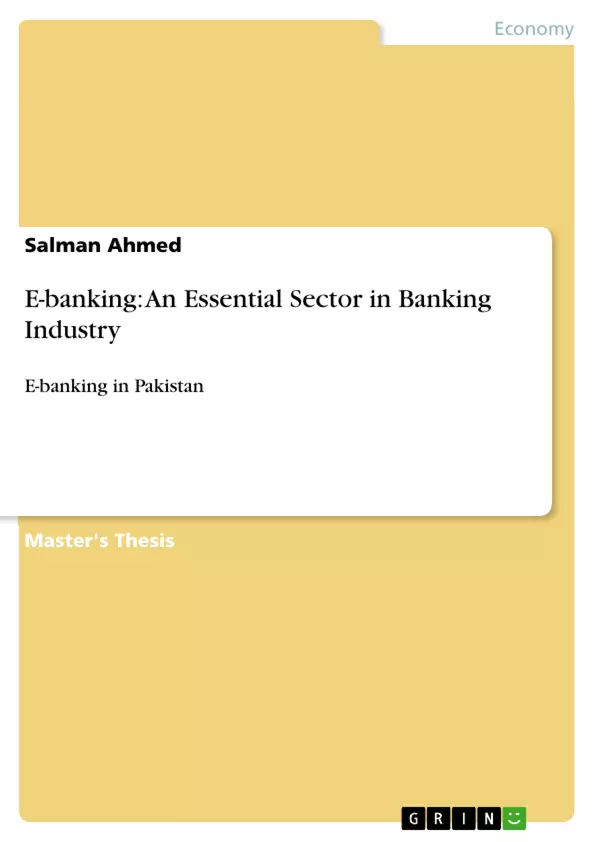
E-banking: An Essential Sector in Banking Industry
Masterarbeit, 2012
63 Seiten
Leseprobe
Table of Contents
- Chapter 1: Introduction
- 1.1 Introduction
- 1.2 Purpose of study
- 1.3 Research Objectives
- 1.4 Hypothesis
- 1.5 Research Methodology
Objectives and Key Themes
The objective of this research report is to highlight the importance of e-banking in the banking industry and assess its growth and benefits for both customers and bankers. The study aims to determine the efficiency, accuracy, and speed of e-banking services.
- The impact of technology on the banking industry.
- The evolution and adoption of e-banking in Pakistan.
- Benefits of e-banking for customers and banks.
- Efficiency, accuracy, and speed of e-banking services.
- Competitive landscape within the banking sector driven by technological advancements.
Chapter Summaries
Chapter 1: Introduction: This chapter provides an overview of the emergence of e-banking in Pakistan, starting with its introduction by foreign banks in the mid-1990s and subsequent adoption by domestic banks. It emphasizes the rapid technological changes in the financial industry and the increasing competition among financial institutions globally. The chapter highlights the significant impact of e-banking on the development of flexible payment methods and user-friendly banking services. It defines e-banking and its various applications, including account monitoring, online shopping, bill payments, and money transfers. The chapter also underscores the benefits of e-banking, such as cost reduction, time savings, and reduced physical effort, ultimately positioning e-banking as a crucial element in the modern banking landscape and a response to evolving customer needs and intense competition within the Pakistani banking sector.
Keywords
E-banking, electronic banking, banking industry, Pakistan, technology, financial services, customer benefits, competition, efficiency, accuracy, speed, payment methods, online banking, virtual banking.
Frequently Asked Questions: Comprehensive Language Preview
What is the purpose of this research report?
The research report aims to highlight the importance of e-banking in the banking industry, assessing its growth and benefits for both customers and bankers. It seeks to determine the efficiency, accuracy, and speed of e-banking services.
What are the key themes explored in this report?
Key themes include the impact of technology on the banking industry, the evolution and adoption of e-banking in Pakistan, the benefits of e-banking for customers and banks, the efficiency, accuracy, and speed of e-banking services, and the competitive landscape within the banking sector driven by technological advancements.
What does Chapter 1 cover?
Chapter 1 provides an overview of e-banking's emergence in Pakistan, beginning with its introduction by foreign banks in the mid-1990s and its subsequent adoption by domestic banks. It discusses rapid technological changes in the financial industry, increasing global competition, and the significant impact of e-banking on flexible payment methods and user-friendly banking services. It defines e-banking and its applications (account monitoring, online shopping, bill payments, money transfers), highlighting benefits like cost reduction, time savings, and reduced physical effort. Finally, it positions e-banking as crucial in the modern banking landscape, responding to evolving customer needs and intense competition within the Pakistani banking sector.
What are the key words associated with this research?
Key words include: E-banking, electronic banking, banking industry, Pakistan, technology, financial services, customer benefits, competition, efficiency, accuracy, speed, payment methods, online banking, virtual banking.
What is included in the Table of Contents?
The Table of Contents includes an introduction, a statement of purpose, research objectives, a hypothesis (though the content of the hypothesis is not provided in this preview), research methodology, and chapter summaries.
What is the overall scope of this document?
This document is a comprehensive language preview providing the title, table of contents, objectives and key themes, chapter summaries, and keywords of a research report focusing on e-banking in Pakistan.
Details
- Titel
- E-banking: An Essential Sector in Banking Industry
- Untertitel
- E-banking in Pakistan
- Veranstaltung
- Banking & Finance
- Autor
- Salman Ahmed (Autor:in)
- Erscheinungsjahr
- 2012
- Seiten
- 63
- Katalognummer
- V206653
- ISBN (eBook)
- 9783656344476
- ISBN (Buch)
- 9783656344766
- Dateigröße
- 2248 KB
- Sprache
- Englisch
- Anmerkungen
- This piece of work is a group effort of two students. Teachers comment our work as Good work done by the students.
- Schlagworte
- Ebanking Banking Banking industry in Pakistan Ebanking an emerging field in Banking sector
- Produktsicherheit
- GRIN Publishing GmbH
- Preis (Ebook)
- US$ 32,99
- Preis (Book)
- US$ 43,99
- Arbeit zitieren
- Salman Ahmed (Autor:in), 2012, E-banking: An Essential Sector in Banking Industry, München, Page::Imprint:: GRINVerlagOHG, https://www.diplomarbeiten24.de/document/206653
- Autor werden
- Ihre Optionen
- Vertriebskanäle
- Premium Services
- Autorenprofil
- Textarten und Formate
- Services für Verlage, Hochschulen, Unternehmen

- © GRIN Publishing GmbH.
- Alle Inhalte urheberrechtlich geschützt. Kopieren und verbreiten untersagt.
- info@grin.com
- AGB
- Open Publishing
Der GRIN Verlag hat sich seit 1998 auf die Veröffentlichung akademischer eBooks und Bücher spezialisiert. Der GRIN Verlag steht damit als erstes Unternehmen für User Generated Quality Content. Die Verlagsseiten GRIN.com, Hausarbeiten.de und Diplomarbeiten24 bieten für Hochschullehrer, Absolventen und Studenten die ideale Plattform, wissenschaftliche Texte wie Hausarbeiten, Referate, Bachelorarbeiten, Masterarbeiten, Diplomarbeiten, Dissertationen und wissenschaftliche Aufsätze einem breiten Publikum zu präsentieren.
Kostenfreie Veröffentlichung: Hausarbeit, Bachelorarbeit, Diplomarbeit, Dissertation, Masterarbeit, Interpretation oder Referat jetzt veröffentlichen!
- GRIN Verlag GmbH
-
- Nymphenburger Str. 86
- 80636
- Munich, Deutschland
- +49 89-550559-0
- +49 89-550559-10
- info@grin.com
-









